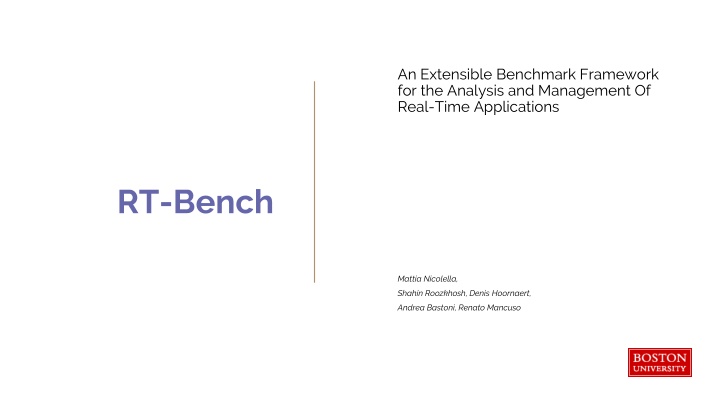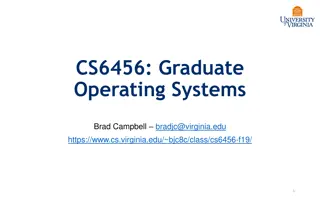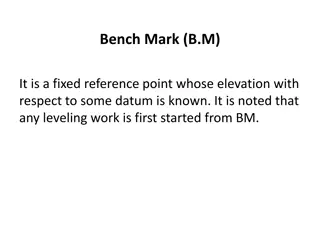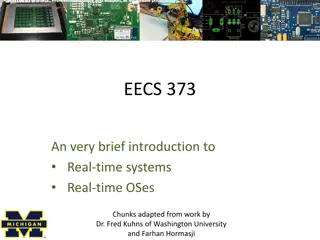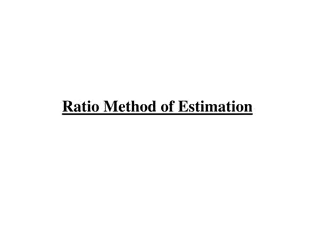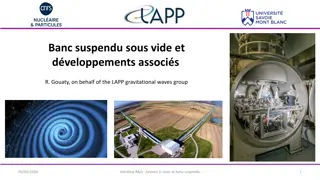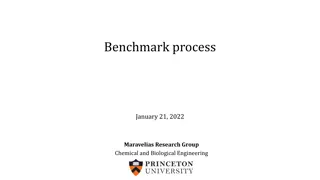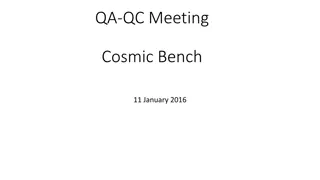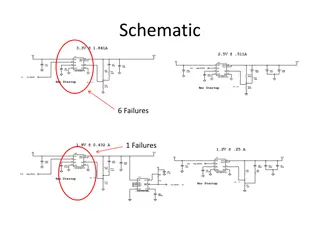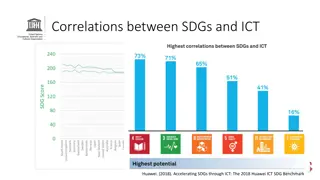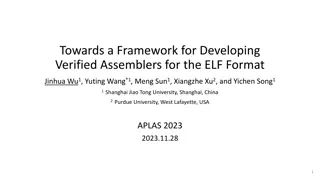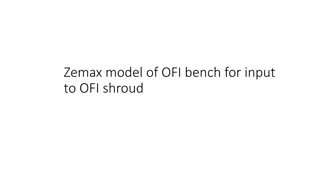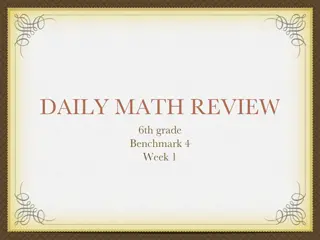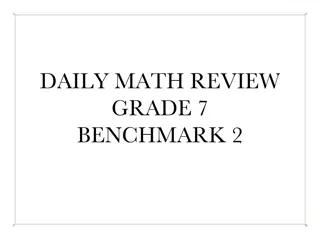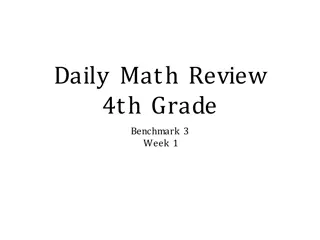RT-Bench: Extensible Real-Time Benchmark Framework
RT-Bench is an extensible benchmark framework designed for analyzing and managing real-time applications. It focuses on benchmark-driven analysis, offering a variety of popular benchmark suites, features, motivations, principles, structure, and portability. With a goal to improve existing benchmarks without altering their logic, RT-Bench provides a comprehensive approach to analyzing real-time systems and their performance metrics.
Download Presentation

Please find below an Image/Link to download the presentation.
The content on the website is provided AS IS for your information and personal use only. It may not be sold, licensed, or shared on other websites without obtaining consent from the author.If you encounter any issues during the download, it is possible that the publisher has removed the file from their server.
You are allowed to download the files provided on this website for personal or commercial use, subject to the condition that they are used lawfully. All files are the property of their respective owners.
The content on the website is provided AS IS for your information and personal use only. It may not be sold, licensed, or shared on other websites without obtaining consent from the author.
E N D
Presentation Transcript
An Extensible Benchmark Framework for the Analysis and Management Of Real-Time Applications RT-Bench Mattia Nicolella, Shahin Roozkhosh, Denis Hoornaert, Andrea Bastoni, Renato Mancuso
Analyzing Real-Time Systems Static Analysis Execution time Deadline status WCET WSS System Utilization Task Schedulability System Behavior RT-System Benchmark -driven Analysis Synthetic Pragmatic Full-Scale 3
Popular Benchmarks Suites Synthetic Pragmatic Pragmatic Full-Scale RTEval [2] TACLeBench [7] EEMBC [6] PapaBench [10] RT-Tests [1] SD-VBS [13] MiBench [9] IsolBench [12] M lardalen [8] PARSEC [4] SPLASH [3,11] Rodinia [5] 4
Benchmarks Suites RT Features Execution Time Periodic Execution Profiled WCET Profiled WSS Utilization Synthetic Pragmatic Pragmatic Full-Scale RTEval [2] TACLeBench [7] EEMBC [6] PapaBench [10] RT-Tests [1] SD-VBS [13] MiBench [9] IsolBench [12] M lardalen [8] PARSEC [4] SPLASH [3,11] Rodinia [5] 5
RT-Bench: Motivations and Principles Real- Time Abstracti- on Payloads are executed periodically. Statistics are collected for each period. Missing features Many suites have missing features for RT-Systems. All benchmarks report the same statistics. Original output can be Common Interface preserved. Adapt existing suites Adding benchmarks is easy. Documentation is available. Linux & POSIX.4 compliant. Extensibi- lity Time could be better spent Bugs can be introduced. Could be done multiple times. Different implementations of the same features. RT-Bench Improve existing benchmarks without altering their logic. Only benchmark payload considered for stats. Compati- bility Implements RT features in a generic way. Multiple benchmarks use the same implementation. All benchmarks have the same features. 6
RT-Bench: Structure and Portability Application layer Overhead Test Profiled WSS,WCET, Plots generation Utils (optional) RT-Bench generator Adds RT features POSIX.4 compliant Linux scheduler syscalls Glibc Operating System x86 ARM64 Hardware Layer 7
RT-Bench generator Benchmarks collection b. RT-Bench Genenerator c. d.e. a. ? Inititalization Execution Tear-down Compilation process RT-Bench. Gen. + a RT-Bench. Gen. + b RT-Bench. Gen. + e Standalone binaries 8
Under the hood: RT-Bench generator Period timer Measures & log Yes Initiali- zation New period? Iteration == n ? Execution No No Error Error Yes Captures timestamp Tear-down Exit No Yes Yes Enable ? Sample & Wait Bmark. running? Profiling/Monitoring Thread No 9
Extending RT-Bench initialization() main() execution() teardown() Split main logic into: Initialization Execution Tear-down RT-Bench compatible benchmarks Benchmark collection ~300 SLOCs for one SD-VBS benchmark 10
Bare-Bones Use Case Periodic execution Deadline status Response time Utilization System to analyze RT-Bench Executable Stats report on terminal or in a file Core Pinning Set Sched policy Set Priority Dynamic memory allocation constrain 11
Bare-Bones Use Case: Demo 12
Advanced Use Case System to analyze Monitor cache events Minimum WSS WCET Schedulability ratio 13
Dont be a stranger! RT-Bench is available at: https://gitlab.com/bastoni/rt-bench Try it out Make it better Give us feedback Add features Extend it 14
Thanks! My contacts: mnico@bu.edu https://cs-people.bu.edu/mnico
References 1. RT-Test. https://wiki.linuxfoundation.org/realtime/documentation/howto/tools/rt-tests 2. RTEval. https://wiki.linuxfoundation.org/realtime/documentation/howto/tools/rteval 3. Splash2x benchmark suite. https://parsec.cs.princeton.edu/parsec3-doc.htm#splash2x 4. Bienia et al. 2008. The PARSEC benchmark suite: Characterization and architectural implications. In Proceedings of the 17th international conference on Parallel architectures and compilation techniques. 72 81. 5. Che et al. 2009. Rodinia: A benchmark suite for heterogeneous computing. In 2009 IEEE international symposium on workload characterization (IISWC). IEEE, 44 54. 6. Embedded Microprocessor Benchmark Consortium. EEMBC Benchmarks. https://www.eembc.org/products 7. Falk et al. 2016. TACLeBench: A Benchmark Collection to Support Worst-Case Execution Time Research. In 16th International Workshop on Worst-Case Execution Time Analysis (WCET 2016) (OpenAccess Series in Informatics (OASIcs), Vol. 55), Martin Schoeberl (Ed.). Schloss Dagstuhl Leibniz-Zentrum f r Informatik, Dagstuhl, Germany, 2:1 2:10. 8. Gustafsson et al. 2010. The M lardalen WCET benchmarks: Past, present and future. In 10th International Workshop on Worst-Case Execution Time Analysis (WCET 2010). Schloss Dagstuhl-Leibniz-Zentrum fuer Informatik. 9. Guthaus et al. 2001. MiBench: A free, commercially representative embedded benchmark suite. In Proceedings of the fourth annual IEEE international workshop on workload characterization. WWC-4 (Cat. No. 01EX538). IEEE, 3 14. 10. Nemeret al. 2006. Papabench: a free real-time benchmark. In 6th International Workshop on Worst-Case Execution Time Analysis (WCET 06). Schloss Dagstuhl-Leibniz- Zentrum f r Informatik. 11. Sakalis et al. 2016. Splash-3: A properly synchronized benchmark suite for contemporary research. In 2016 IEEE International Symposium on Performance Analysis of Systems and Software (ISPASS). IEEE, 101 111. 12. Valsan et al. 2016. Taming Non-Blocking Caches to Improve Isolation in Multicore Real-Time Systems. In 2016 IEEE Real-Time and Embedded Technology and Applications Symposium (RTAS). 1 12. https://doi.org/10.1109/RTAS.2016.7461361 13. Venkata et al. 2009. SD-VBS: The San Diego Vision Benchmark Suite. In 2009 IEEE International Symposium on Workload Characterization (IISWC). 55 64. https://doi.org/10.1109/IISWC.2009.5306794 16
